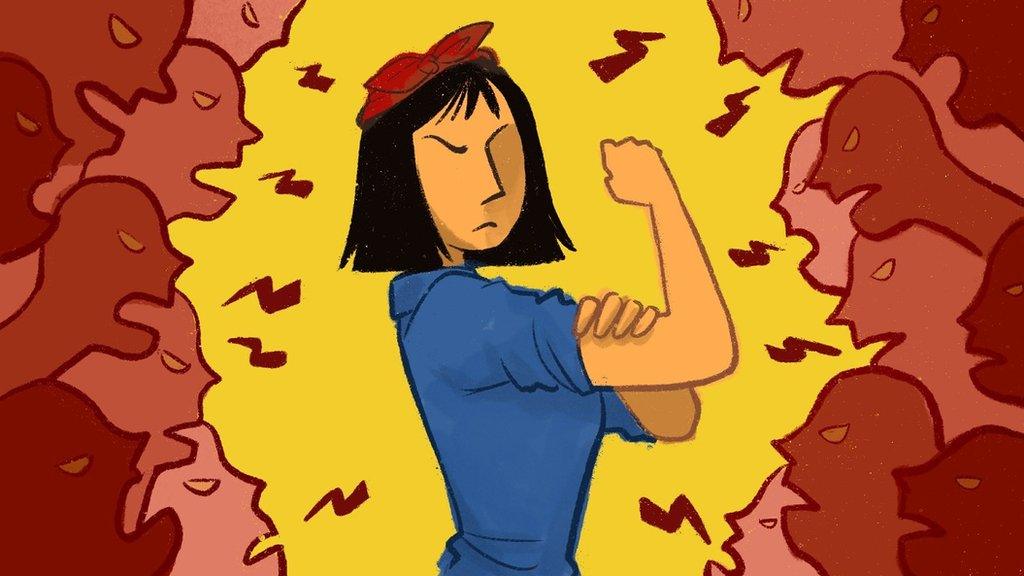China's latest online skinny fad sparks concern
- Published
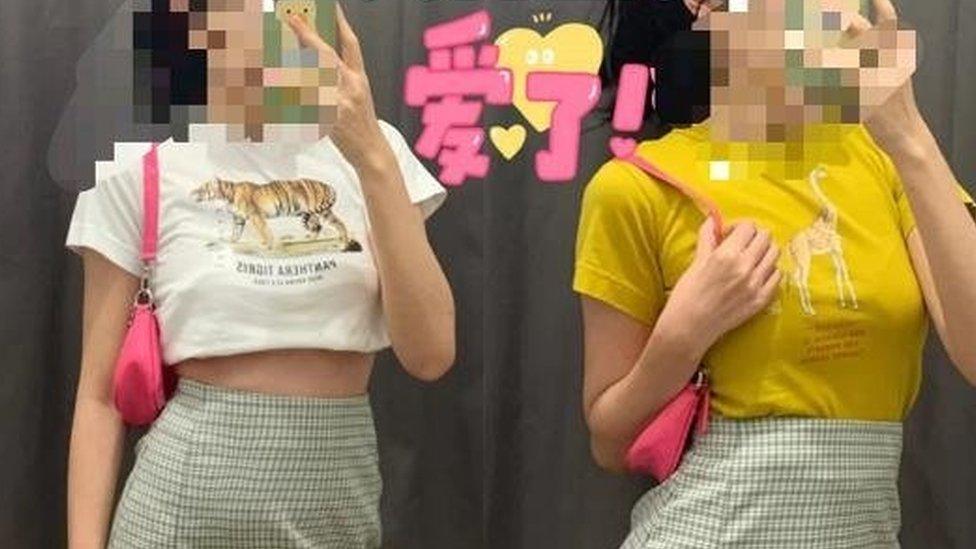
Young Chinese women on social media are posting photos of themselves trying on Uniqlo kids' t-shirts
In the latest fad to rock Chinese social media, women have been flocking to Uniqlo stores to post pictures of themselves trying on clothes - from the children's section.
Platforms such as Xiaohongshu and Weibo - the Chinese equivalent of Instagram and Twitter - have been flooded with selfies of young women in fitting rooms, wearing tiny T-shirts from the popular Japanese retailer.
On Weibo alone, the hashtag "adults trying on Uniqlo children's clothes" has received more than 680 million views.
Uniqlo China has yet to respond to BBC queries on the trend, which appears to have been started by netizens in recent weeks.
It has sparked widespread debate online - not only because it's reportedly resulted in ruined T-shirts - but also because it is the latest in a series of Chinese social media trends which observers say illustrate an unhealthy obsession among some Chinese women with looking thin.
Other trends which have gone viral in the past include the "belly button challenge", where women wound their arms around their back to touch their belly button, and the collarbone challenge, which had girls balancing coins behind their collarbones.
There was also the "A4 waist challenge", where women shared photos of waists as wide as the narrow edge of an A4 piece of paper, which measures 21cm (8.2in).
'BM Style'
In fact, such extreme viral skinny challenges pop up so frequently on Chinese social media that there are even niche categories. The Uniqlo trend is an example of "BM Style", a teen fashion aesthetic involving crop tops, slim jeans and short skirts.
It takes its name from the Italian clothing brand Brandy Melville which mostly stocks one-size-fits-all pieces. Its standard size is comparable to the extra-small size from other brands.
The trend started gaining popularity last year, after young Chinese women began sharing pictures of themselves in crop tops and dresses by the brand with the hashtag "test if you can wear the BM style".
One 22-year-old Weibo user who frequently posts such pictures told BBC Chinese that she liked the style as "it looks sexier and sweeter... and it makes one's legs look longer."
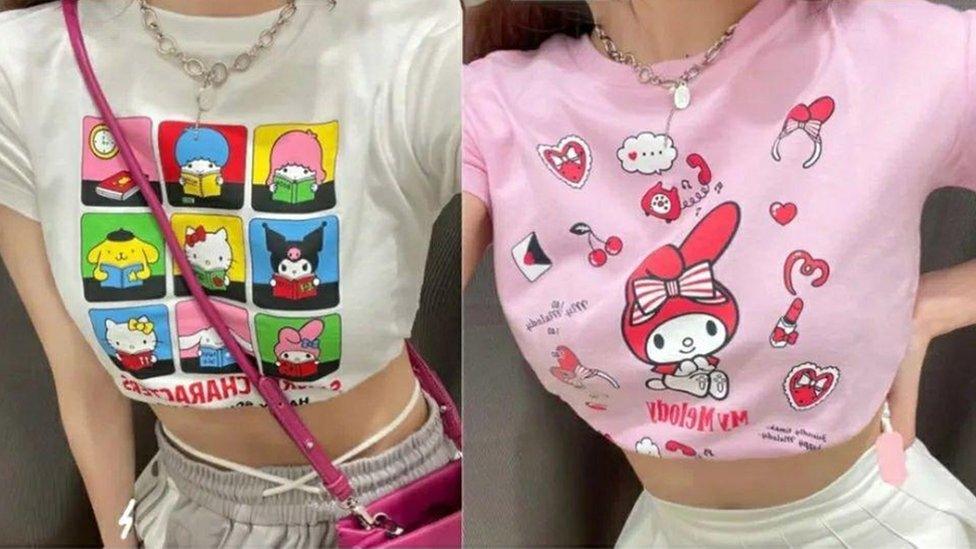
"BM Style" pictures have grown in popularity on Chinese social media since last year
But the rise in popularity of such trends has sparked concern that they are fuelling pressure for women to be unnaturally thin.
There has been criticism of a viral and unverified size chart indicating how much a "BM girl" should weigh according to her height - one example given was that a woman with a height of 160cm should weigh only 43kg.
An online body mass index (BMI) calculator provided by Britain's National Health Service says some of the figures on the chart could mean a person was underweight and advises they consult a doctor.
On Weibo, the hashtag "how women should overcome body anxiety" has also received almost 70 million views.
"The scary thing about the 'BM style' is that everyone knows it is unhealthy, and yet they feel pressured to pursue this aesthetic. Some people overlook their health for this - it's just not worth it," said one user.
He Jinbo of the Chinese University of Hong Kong, who studies mental health and body image, said his latest research on Chinese adolescents found that the more time a teenager spent on social media, the more likely the teen would be dissatisfied with his or her body.
While it is not the only society grappling with this problem, experts have told the BBC that the issue is more fraught in China where notions of body positivity have yet to take root.
A 2019 Ipsos online survey on global beauty standards, external found that out of 27 countries, China came out top in believing that body weight and shape are important attributes in making a woman beautiful. The Chinese were also the second most likely to pick the skinniest body types as "ideal" for women.
'A good woman cannot weigh over 50kg'
Chinese psychologist Ke Han from Singapore's Nanyang Technological University noted that Chinese media tends to feature "very thin girls" and the public tends to favour waif-like female celebrities.
"There is a popular Chinese saying which means 'a good woman cannot be over 100 jin' which is about 50kg [110lb]," Dr Ke said.
"Women who are heavier than that are then considered lazy and lack self-discipline because they cannot seem to take care of themselves... some women believe this so much that they think it'll affect their marriage prospects."
Many people still hold a patriarchal view which objectifies women, she said. "Being slim and beautiful implies 'good value' as an object."
It is also generally culturally acceptable to be direct when talking about someone's weight. "The majority of Chinese people have not realised the damage that fat-shaming can have on someone's well-being," said Dr He Jinbo.
Online eating disorders 'trigger' crackdown call
But there are signs of change, and more "are beginning to be influenced by body positivity movements elsewhere... you can start to see some talk online," said Dr Ke Han.
Last year, lingerie brand Neiwai made headlines when it launched a body positive advertising campaign. The brand's diverse sizing stood out among Chinese retailers which tend to carry items only in limited smaller sizes.
Earlier this month, popular Chinese actress Zhang Meng sparked discussion online when she revealed on Weibo that she had to seek medical treatment after attending an awards ceremony, as she had worn a corseted dress that was so tight that it had caused severe pain in her ribs.
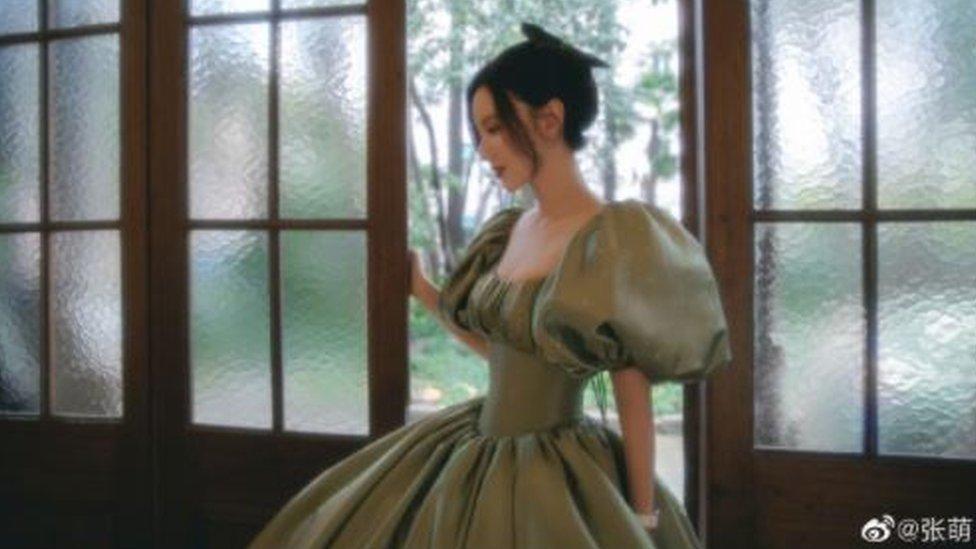
Ms Zhang posted a picture of herself wearing the dress
She said the incident served as a wake-up call. "Our looks are only one part of us. Instead of complaining every day that we are not thin enough, it's better to spend that time learning new things, enriching ourselves, and make ourselves more confident!"
Many social media users responded with messages of support.
Said one commenter: "This is really how it should be. So many women have body anxiety issues, but health is much more important. No matter what we look like, we are all the most beautiful."
If you, or someone you know, has been affected by this story you can get support and advice from BBC Action Line.
Related topics
- Published22 June 2020
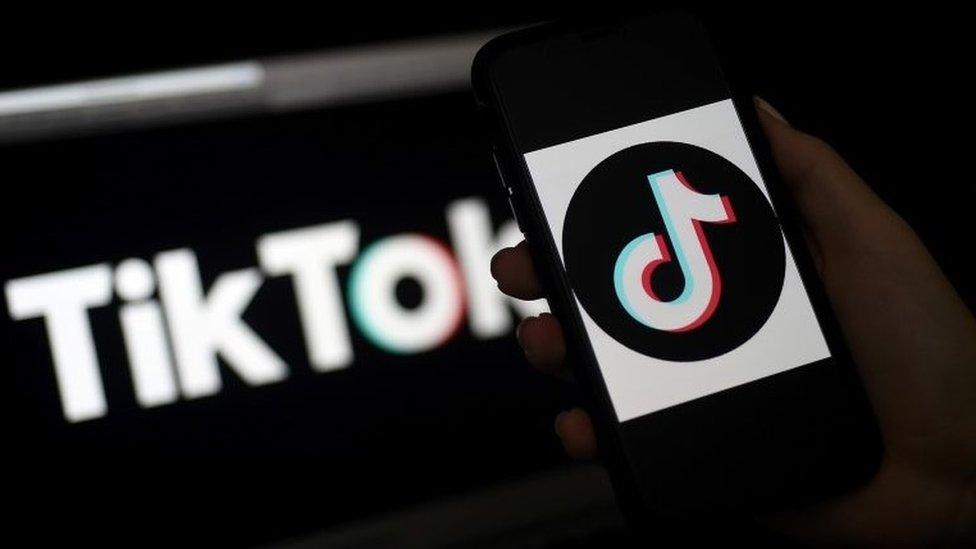
- Published25 January 2021
